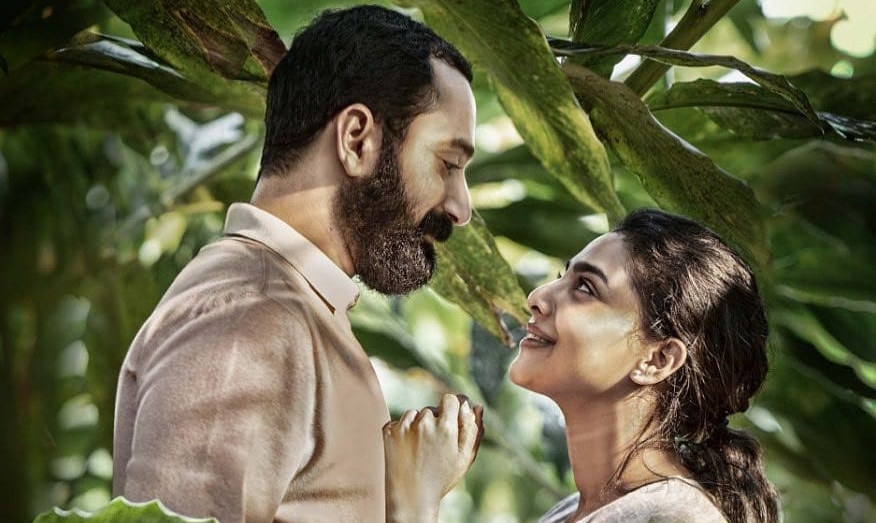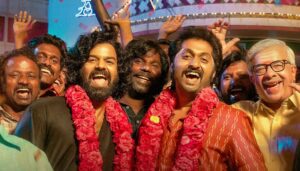
Varathan took me back to Elizabeth Kenny’s famous words, “It’s better to be a lion for a day than a sheep all your life,” The statement has sheepish cinematic sound to it and no wonder, we have creators including Neerad making films till date around various iterations of the philosophy.
Coming to the film, there is a lovely scene in Varathan where Abin (Fahadh Faasil) and Priya (Aishwarya Lekshmi) are travelling in a taxi. She tenderly places her head on Abin’s shoulder. The driver finds it absolutely appropriate to ogle at the couple through the car’s rear-view mirror. Our leading man Abin is either too absent-minded to observe or is simply reticent to deal firmly with what could lead to an uneasy situation. It is Priya who acts instantly and wedges the voyeur off in seconds. We see Priya repeat the same gesture of affection with Abin on few more occasions. Coming from a strong, educated and independent woman, the act possibly signals that she subconsciously desires him to display the protective side that is expected traditionally out of a husband.
To give a little more context, Varathan is about a couple that moves from Dubai to Kerala after the man of the house loses his job. The Dubai segment does appear a little forced even though the interactions between the duo is of gold standards. Theirs is an equal relationship, rooted in love and mutual respect. Both are empathetic about each other’s needs and, hence, they take a well-analyzed decision to ditch the metropolis and land up in ‘God’s Own Country’. In Priya, we get a female lead with an agency and is also someone who is realistic and vulnerable. Abin is part awkward, part ambiguous and the film also refuses to reveal much about him except that he grew up in boarding schools and that he has a brother who lives in Bangalore. He is also slightly socially awkward and is not as expressive as Priya expects him to be. After a brief and somewhat unpleasant visit to Priya’s mother’s home, the duo set off to live in her ancestral bungalow in a far-off village. As we see, the new house and the surroundings have quite a few surprises in store for the unassuming, urban couple.
ALSO READ: ‘Trance’ review – Anwar Rasheed’s audacious film takes on the business of religion
Penned by Suhas–Sharfu, Varathan begins to take interesting turns once the duo lands up in the creepy and (for some reason) secluded village. The eerie bungalow and the strange paraphernalia that it houses are introduced one by one accompanied by a suitably arresting original score (Sushin Shyam). Then we see a series of slow-motion shots and bizarre camera angles – including aerial ones, even in places where they aren’t warranted – reminding us that we are in for an Amal Neerad feature. The seclusion of the place coupled with the makers’ decision to introduce characters with uniformly superficial traits (lecherous, culturally-appropriating, intimidating and the likes), Varathan raises a few questions. Where is the village’s womenfolk? Why didn’t Priya pre-empt any of the evils despite being well-acquainted with the area and its accepted norms? Let’s not talk about the law and order forces who are seldom in the picture. Could that be the reason why normal homes out there houses deadly weapons? Well, who knows.
By now, it is evident how Varathan is myopic in its representation of the region. All we see are misogynists, sycophants and frauds and, wait, this isn’t a comedy of manners or an absurdist piece. Especially as we look at the scenario through Abin’s eyes, no character (except the typecast Dileesh Pothen) is up for any good. They misbehave, conduct malpractices in shops, beat up children, harass women – the list is endless. Come to think of it, this is the same place where an evolved and exceedingly successful woman like Priya grew up. Even the filler characters offer no variation with respect to their character sketches and that’s when you expect the story to offer some surprises, which it doesn’t. The ending, though well-written and executed, has an air of implausibility looming large, making one feel queasy throughout. Even though it is a way to validate Abin as a classic cinema hero, we wish the film had prepared us for this drastic transformation of his. A film like Drishyam, at least, offered a series of answers to several “whys” and “hows”, which is exactly the area where Varathan falters. For a fact, the enters an altogether different territory the moment we hear the villains repeatedly exclaim variations of, “What was his job in Dubai?”. It is indeed used for humour but the core idea here is to establish the violent hero within the otherwise refined Abin whose family honour lay tested.
With its peculiar music turning moodier, the film oozes an unusual energy as it approaches the pre-climactic conflict, followed by a 30-minute long climax sequence that can be rousing for an average viewer. Albeit predictable, this stretch unravels the mystery around several elements and references that were initially thrown in and around the bungalow. The physical abuse bit, again, gets a callous mention and the culmination of it would set no example to films that deal with this sensitive topic. Instead, the film takes the conventional heroic route, with certain pre-designed Drishyam–styled cat-and-mouse games. One can even call it a less-glorified Kaabil with a smarter director and writing that sees details in abundance.
Having said that, the film is not a damp squib either. Once it decides to play to the gallery, the leading man Fahadh Faasil reacts so organically that his knockout performance is enough to elevate the film several notches higher. We see a bunch of fierce glances and coupled with those smouldering pair of eyes, Fahadh’s innate responsiveness is tremendous throughout. If we notice, he maintains a quiver in his voice even as he mouths some of the most ferocious lines. Aishwarya Lekshmi is pitch perfect as she brings to life Priya with great empathy. However, one wishes that the distinct shade of feminism in her characterization hadn’t vaporized so easily in the latter half. Sharafudeen in a menacing turn excels in a look that is undoubtedly borrowed from Subramaniapuram.
One that translates to ‘outsider’ the title of the film is not common lingo for the region that it seems to be set in (we see a fleeting dig at a certain controversial Member of Kerala’s Legislative Assembly). Therefore, it does sound jarring when the characters take the term frequently to assert how Abin is a ‘varathan’ to the place when, he, in the pure sense is the son-in-law to one of the most well-to-do families in the village. The film is also stylishly shot with DOP Littil Swayamp’s camera being as magical as it was in the recent Koode. Varathan is also increasingly tense and eerie which is something that made absolute sense in Faasil’s own film Carbon earlier this year. Here, however, several elements and making quirks exist just so that they could justify Neerad’s characteristic style. Varathan could have been a lot more effective if it were to interpret its title smartly enough, by giving us an enthralling background to our veiled leading man’s past life. No, this is no reference to his syrupy chapter from Bangalore Days but a derivate of it certainly wouldn’t have hurt, I reckon.
Rating: ★★★

